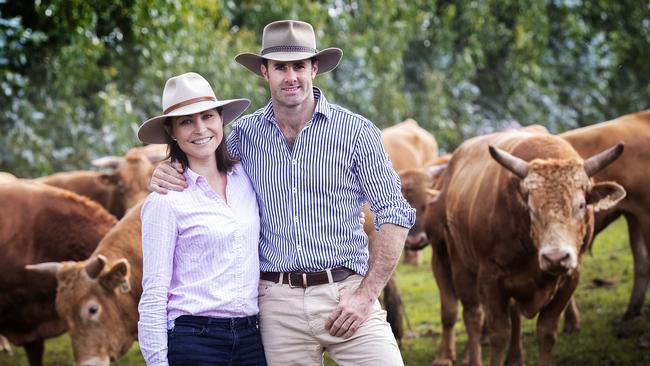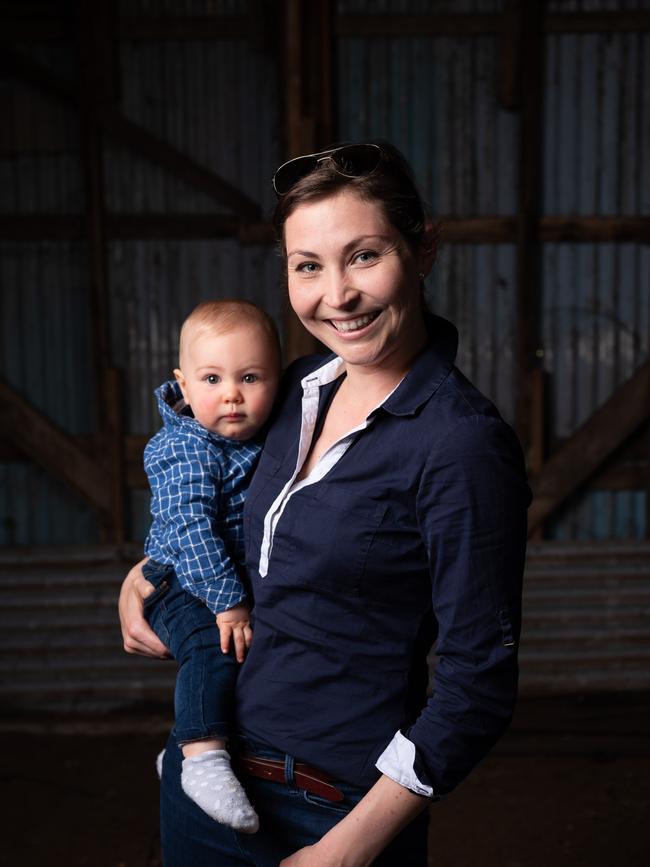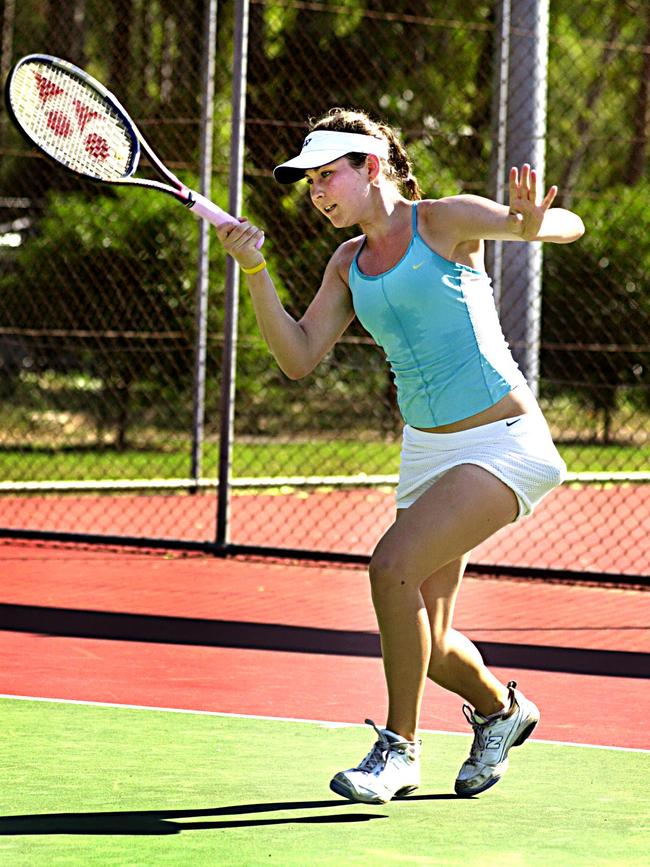Podcast for isolated farm mums was lifesaver for podcaster as well
Former journalist Stephanie Trethewey is putting her skills to good use on a beef farming venture - and for isolated mums all over Australia.

Lifestyle
Don't miss out on the headlines from Lifestyle. Followed categories will be added to My News.
Stephanie Trethewey might be a farmer these days but she still talks like a journalist.
Originally trained as a television journalist and producer, she still has the knack for slipping straight into professional patter mode, anticipating my questions and answering them concisely before I can even ask them.
Even with a toddler at her feet the whole time, she remains completely focused, with that reporter’s instinct of cutting right to the chase.
“I’m sorry,” she laughs. “I know, I talk really fast!”
But it is a skill that has served her well in her life, even in her life after journalism.
After working all over the country on high-rating programs like A Current Affair and Sunday Night, Trethewey has settled at Dunorlan, near Deloraine in the North, with husband Sam and 19-month-old son Elliot, to run a Wagyu beef business.
And if she felt like a fish out of water running a cattle farm, adding motherhood on top of it all left her feeling like she was drowning.
But she fell back on her old journalistic skills to come up with an idea that she says saved her sanity, as well as throwing a lifeline to tens of thousands of others like her around the country.
In December she launched her own podcast, Motherland Australia, dedicated to sharing the stories of rural and farm mums from all over Australia.
The podcast now has more than 50,000 downloads and has earnt Trethewey a nomination in the 2020 AusMumpreneur Awards. And not only has it helped mums nationwide feel less isolated, it has helped Trethewey find her feet again, too.
“I’m really proud of it, when it launched I said to Sam I hope someone listens!” she says. “If it was only 10 women I would have kept doing it, so this is incredible. I’ve talked to some amazing mums from all over Australia now and it’s been my medicine, in a way. It’s made me feel less alone.”

Trethewey grew up in Sydney, with an Australian father and a Polish mother, and was originally on a path to being a professional tennis player.
“I left school in Grade 10 and got a scholarship to play tennis, so I was home schooled by distance education for years 11 and 12 while I toured the world to play,” she says.
“I did the WTA Tour as a teenager and was 15 or 16 when I got my rating. But physically my body really suffered, it was under immense pressure as a teen — I had a stress fracture in my back.
“Eventually I got a tennis scholarship at California State University, Long Beach, in the US but I had to decide what I was going to study while I was there, and I had no idea.
“All I knew was, I love a chat. I grew up watching the news and 60 Minutes with my parents, so I started a journalism degree and played tennis in between studying. It was very full-on. I did that for a year and then decided I wanted to finish my degree at home.”
Trethewey finished her journalism degree at the University of Technology, Sydney, where she fell in love with broadcast journalism, discovering her passion for bringing stories to life visually.
She got her first media job in Sydney as assistant chief of staff for Channel 9 News while still finishing her degree. Later she went on to be a producer on the Today show, a reporter for regional news service NBN Newcastle, and then bureau chief for Channel 7 at Rockhampton in Queensland.
In Rockhampton she met the man who would become her husband, Sam Trethewey, a third-generation farmer originally from Tasmania.
“I met him at an agricultural event in Rocky,” Trethewey says. “It was a slow news day for me, I needed a story and this event was happening so I thought OK, it’s a big agricultural community, I can’t go wrong here.
“I interviewed him for a story about meat farming on the six o’clock news, and now here we are doing that together!”
Trethewey took a job reporting for A Current Affair in Brisbane and Sam followed her there and to every other job she took around the country: reporting for A Current Affair in Melbourne, and as a producer for Sunday Night in Sydney.
Everywhere they went, Sam — who has an Executive Master of Business Administration from Bond University — found work in the agribusiness sector.
But Stephanie was getting tired of the stress and intensity of news media and made the jump to corporate communications in Melbourne for a change of pace. Around that time she and Sam started yearning for a simpler way of life.
“I remember we were watching Gourmet Farmer on TV at the time we started forming this romantic notion of going back to farming,” she says.
“Sam wanted to come home to Tassie, which sounded lovely to me. I was pregnant at the time as well, and we came up with this idea for a Tasmanian agricultural company selling Wagyu beef and also incorporating carbon sequestration and regenerative energy.
“Sam is a farmer — you can take the boy out of the farm but you can’t take the farm out of the boy — and my strength is in storytelling and brand-building, so between us we had it covered.
“So that was it, we moved in July last year. I got on the Spirit of Tasmania with a six-month-old baby who wasn’t sleeping, landed on this farm that was — to someone like me — in the middle of nowhere, and suddenly found myself on my own with a baby and thinking ‘Oh God, what have I done?’ ”

The Tretheweys’ farm at Dunorlan, near Deloraine, turned out to be the perfect spot for their new business, Tasmanian Agricultural Company, rearing and marketing Wagyu beef cattle.
But Trethewey says she suffered badly with postnatal depression in the first months of being a mum.
“We struggled, early parenthood was hard,” she says. “Here we were on this beautiful farm but I felt like I had lost a lot of my identity as a career woman, and had become ‘just a mum’.
“I spent a lot of time being resentful of motherhood, what it took from me. Elliot was a shocking sleeper, he had colic, was up every 45 minutes all night, which puts a lot of stress on you.
“We had no family support apart from Sam’s family in Hobart, which was a long way from Deloraine. In Melbourne I was used to being able to call my mum to watch Elliot for an hour if I had something to do, and suddenly I couldn’t do that.
“I suddenly couldn’t just get the pram and go down the road to grab a coffee, I no longer had the mothers’ group I was part of in Melbourne. It was really hard.”
It was from the depths of this despair that Trethewey’s podcast, Motherland Australia, was born.
And suddenly, sitting in her home on a farm in rural Tasmania, she found herself in her element again.
“I thought surely I’m not the only rural mum who’s struggling. What I needed was to hear those stories of struggle and hardship from other mums, but there was no platform providing that, so I made my own.
“I made the logo myself in a night, launched an Instagram account, found my first mum to interview and I haven’t looked back since. That project saved me, it gave me back that fire in my belly, and for first time ever I feel really settled, I love being where I am.”
Trethewey says the podcast has been her medicine, keeping her going during the rough patches and giving her the validation she needed when she felt like she had compromised too much of herself.
Most of all, she says the podcast has built a community of rural mums from all over Australia, many of them in far more isolated places than Dunorlan, who are suddenly able to hear the stories of other women in similar situations, and who are able to communicate with each other to share their experiences.
“Rural mums have a very specific set of challenges and you just can’t compare life in the city to life on the land, especially in motherhood,” Trethewey says.
“I speak to some incredible mums for the podcast, like one in the Northern Territory whose daughter had a broken arm for three days, because it was too muddy for the Royal Flying Doctor Service to land a plane.
“I’ve talked to a Tassie mum who has just beaten leukaemia, with an 18-month-old child as well.
“And maybe the best part is that I’ve also launched an online chat room for rural mums through Facebook. You could post something right now just saying ‘I’m having a crappy day’ or ‘my toddler is playing up’, and within minutes you’ll get rural mums from all over the place writing back to you to talk to you about it.
“It makes me feel less isolated and knowing that it has the same impact on so many other mums is an incredibly rewarding thing for me.”

Trethewey says she still misses some aspects of her old city life, such as being able to walk out the front door and grab a coffee five minutes down the road, or being able to take her pick of dozens of great restaurants a stone’s throw from home.
But she does not miss the high-speed pace that came with that life.
“Some of my best friends in Sydney and Melbourne, looking at them now, I don’t know how they do it,” she says. “They drop their kids at daycare by 7.30am, then drive to work, work a full day, get the kids from daycare and then come home. It’s such a full day.
“But now, where I wake up is where I work. Life here is so incredible, it’s a beautiful place to bring up kids, and it isn’t far to drive to Hobart or Launceston to have that city cultural experience if we want to.”
Elliot is now 19 months old and Trethewey is pregnant with another baby, due in November.
And while the Tasmanian Agriculture Company is still only in its infancy, Trethewey is feeling confident she and Sam will cope with whatever comes their way now.
“Who knows where we will be in 10 years time, because we are still only in the early stages of building our beef brand, but we are really committed to the regenerative food movement, so it’s a real opportunity for us to position ourselves where the consumer market is heading,” she says.
“We’ve already had some interest from some Tassie retailers and chefs, which is great. We’re just really happy to be a Tasmanian brand, and for Tassie to be so proud of us.”
And, while Trethewey has always been very hands-on with the running of the farm, she is still always thinking like a trained communicator.
“I have lots of plans for more stuff in the rural motherhood space, from an advocacy point of view,” she says.
“And it’s my dream to host Australia’s biggest rural mums meet-up at some point, so maybe once the COVID crisis eases and people are able to travel again, we might be able to make that happen.” •


